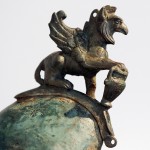 When Amalía gets tired, she turns to me or her father and says “go to casita.” She knows the word “home,” but it’s not exactly what she intends to say. Casita means “little house,” but it doesn’t refer to size in this case (although it’s true, Amalía has never spent more than a few nights in an apartment that is larger than 1000 square feet). I suspect she’s using the diminutive to show affection, to indicate that she wants to go to the home she loves.
When Amalía gets tired, she turns to me or her father and says “go to casita.” She knows the word “home,” but it’s not exactly what she intends to say. Casita means “little house,” but it doesn’t refer to size in this case (although it’s true, Amalía has never spent more than a few nights in an apartment that is larger than 1000 square feet). I suspect she’s using the diminutive to show affection, to indicate that she wants to go to the home she loves.
Amalía can’t get enough of the dimunitive. When you’re reading books with animals, she refers to them as “horsie,” “duckie,” “doggie,” “kitty cat.” It’s as if she wants to make every animal in the world as small and adorable as she is. If there’s not a commonly used diminutive for an animal, she turns it into a baby. “The baby giraffe–he’s so CUTE!” But when we were at a hotel pool in Greece this summer and an older boy (I’d guess he was about seven) said about Amalía, “she’s so cute!” she growled at him, “I no like cute. I no need cute!”
I find it interesting that while Amalía wants the world around her to be little and cute, she doesn’t see herself that way. Part of me thinks that’s great–I would like to print “I no need cute” on a t-shirt (you know, a cute t-shirt) because I think it’s a great warrior cry of strength. But part of me (the innately guilt-ridden part that sometimes dreams I’ve committed a murder and am being chased by the police–what, you don’t have that recurring nightmare?) worries that Amalía is trying to make her world smaller and cuter because we’ve made it too big and confusing.
Amalía turns two next week and has lived in three different places–Miami Beach, New York, and Granada, Nicaragua–and spent about two months in Greece. When she says “my casita,” she’s talking about one of three different apartments she’s lived in, or a hotel room, or, in some cases, the couch–she’ll stand in the kitchen, pointing to the couch in the living room and say “go to casita.” We’ve been doing all this running around partly because we’re trying to give her a sense of home–her maternal grandfather was born in Greece, her father was born in Nicaragua, and we, her parents, lived for years and met in New York. But I don’t know if all of the caravanning about, tracing her roots, has given her a stronger sense of “casita” or if it has caused her to develop an obsession with seeking “casita” because it is what she lacks–a sense of home and consistency.
Or maybe it’s not a blessing or a trauma, but a combination of both; maybe Amalía has both a growing sense of home and a yearning for one. Perhaps she wants a cute little house (a “casita,” or in Greek, “spitaki,”–because Amalía comes from two different cultures that share a deep love of the diminutive) because she’s already learned, before her second birthday, that she’s going to need to carry her casita with her.
 You always hear that parents are supposed to give their children roots and wings. But that makes me imagine Amalía as a gryphon on the corner of a rooftop, trying to take flight but carved in place. Right now she’s more of a snail, carrying her casita on her back. I hope her nomadic start has given her a sense of freedom and adventure rather than anxiety, but who knows? Maybe, in rebellion, she’ll choose to live out her days in a tiny town, surrounded by people who have known her forever. She did seem awfully comfortable this summer in my family’s village in Greece, running around the central square.
You always hear that parents are supposed to give their children roots and wings. But that makes me imagine Amalía as a gryphon on the corner of a rooftop, trying to take flight but carved in place. Right now she’s more of a snail, carrying her casita on her back. I hope her nomadic start has given her a sense of freedom and adventure rather than anxiety, but who knows? Maybe, in rebellion, she’ll choose to live out her days in a tiny town, surrounded by people who have known her forever. She did seem awfully comfortable this summer in my family’s village in Greece, running around the central square.
Or maybe she’ll have the gift of feeling at home anywhere in the world, of taking any space and turning it into a casita. Amalía’s  umbilical cord is buried in the courtyard outside of our apartment in Miami. But I think she’s discovering that casita is where her corazon is. Notice that I didn’t say corazoncito. Because while her house may be small, Amalía’s heart is large. And fierce. She no need cute.
umbilical cord is buried in the courtyard outside of our apartment in Miami. But I think she’s discovering that casita is where her corazon is. Notice that I didn’t say corazoncito. Because while her house may be small, Amalía’s heart is large. And fierce. She no need cute.